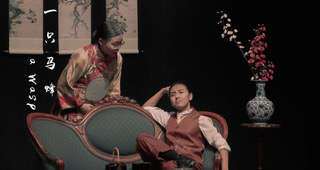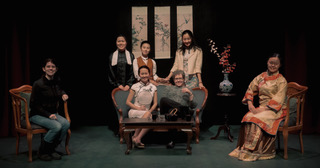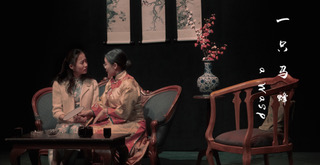Photos courtesy of Amy Wang ’22
From left to right: Madame Ji (Amy Wang ’22) and Mr. Ji (Eelly Zhang) in a scene from “A Wasp”; the cast pose for a photo; Miss Yu (Lillian Lin ’21) and Madame Ji.
BY SABRYNA COPPOLA ’22
The Mount Holyoke Theatre Department presented one-act Chinese play “A Wasp” last Friday, March 1 in Rooke Theater. The play, directed by Nikki Wei ’20, was written by Ding Xilin, a writer best known for his one-act plays from the 1920s and ’30s.
The show is set in an apartment in Beijing where a mother is visiting her son. Madame Ji (played by Amy Wang ’22) is a refined older woman who looks down on the modernity and informality of her son, Mr. Ji (played by Eelly Zhang, a third-year at Hampshire College). Madame Ji wants her son to find a wife, but he is hesitant to settle down. The third principal character, Miss Yu (Lillian Lin ’21) is a nurse who works nearby and is intent on avoiding Madame Ji’s misdirected attempts at matchmaking while simultaneously staying in her good graces.
The play is set in 1923, a tempestuous time in Chinese history. According to Wei, the 1920s were “a time [following] decades of invasions, hundreds of unequal peace treaties, the overthrow of the Qing Dynasty, and the arrival of the May Fourth Movement — and it was swarming with newly-introduced Western ideas.” The conflict between traditional beliefs and new ideas is very clear in the characters’ conversations about matchmaking, marriage and propriety.
This play stands apart for its delicately crafted characters and carefully constructed conversations. Xilin was heavily influenced by Western playwrights such as Henrik Ibsen and Oscar Wilde. This influence is evident in the character of Mr. Ji, who is strikingly similar to Earnest and Algernon from Wilde’s “The Importance of Being Earnest.” Visiting Lecturer in Theatre Arts Heidi Holder served as production advisor and wrote that Mr. Ji is “independent, witty, cheeky and determined to live his life according to his own aesthetic ideals.”
Xilin progressively portrays two women determined to reach their ends through wit and craft. Miss Yu is a modern, subtly headstrong woman with a profession while Madame Ji is assertive, opinionated and set in her ways. The conversations between the two characters onstage were fraught with measured silences and painfully polite exchanges that had the audience in stitches.
When asked about the experience of performing a Chinese play in English, Wang said, “luckily, under the guidance of our amazing director [Wei] — we tried to act in Chinese dialects, feeling the emotions and reckoning the characters’ intentions among the lines. However, I think that it would be an entirely different new vibe if performed in Chinese dialect — the art of word choice. Conciseness and frankness of the original oral language were somewhat lost in translation.”
“A Wasp” was an excellent production, complete with beautiful costumes and outstanding acting. As Wei said, this show is a mix of “Chinese culture and the universal human experience,” making it a perfect bridge between the actors and audience. “With the eternal love story line, [“A Wasp”] displayed the collision of new and old ideas with a sense of humor, sweetness and intensity,” said Wang. Hopefully, this show will bring more international plays to the Mount Holyoke stage.



